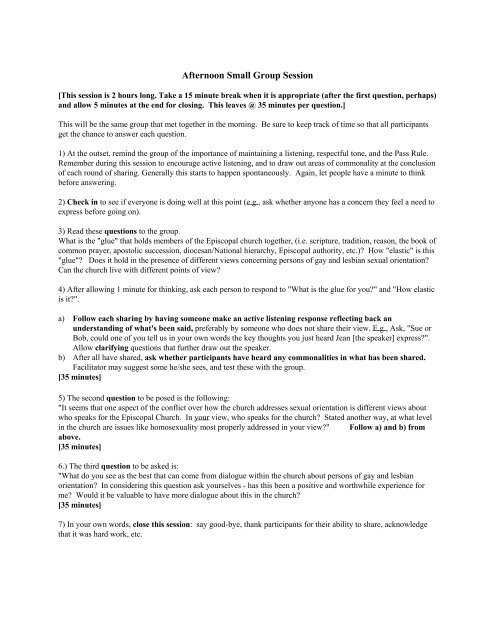The Common Ground Network for Life and Choice Manual
The Common Ground Network for Life and Choice Manual
The Common Ground Network for Life and Choice Manual
You also want an ePaper? Increase the reach of your titles
YUMPU automatically turns print PDFs into web optimized ePapers that Google loves.
Afternoon Small Group Session<br />
[This session is 2 hours long. Take a 15 minute break when it is appropriate (after the first question, perhaps)<br />
<strong>and</strong> allow 5 minutes at the end <strong>for</strong> closing. This leaves @ 35 minutes per question.]<br />
This will be the same group that met together in the morning. Be sure to keep track of time so that all participants<br />
get the chance to answer each question.<br />
1) At the outset, remind the group of the importance of maintaining a listening, respectful tone, <strong>and</strong> the Pass Rule.<br />
Remember during this session to encourage active listening, <strong>and</strong> to draw out areas of commonality at the conclusion<br />
of each round of sharing. Generally this starts to happen spontaneously. Again, let people have a minute to think<br />
be<strong>for</strong>e answering.<br />
2) Check in to see if everyone is doing well at this point (e.g., ask whether anyone has a concern they feel a need to<br />
express be<strong>for</strong>e going on).<br />
3) Read these questions to the group.<br />
What is the "glue" that holds members of the Episcopal church together, (i.e. scripture, tradition, reason, the book of<br />
common prayer, apostolic succession, diocesan/National hierarchy, Episcopal authority, etc.)? How "elastic" is this<br />
"glue"? Does it hold in the presence of different views concerning persons of gay <strong>and</strong> lesbian sexual orientation?<br />
Can the church live with different points of view?<br />
4) After allowing 1 minute <strong>for</strong> thinking, ask each person to respond to "What is the glue <strong>for</strong> you?" <strong>and</strong> "How elastic<br />
is it?".<br />
a) Follow each sharing by having someone make an active listening response reflecting back an<br />
underst<strong>and</strong>ing of what's been said, preferably by someone who does not share their view. E.g., Ask, "Sue or<br />
Bob, could one of you tell us in your own words the key thoughts you just heard Jean [the speaker] express?".<br />
Allow clarifying questions that further draw out the speaker.<br />
b) After all have shared, ask whether participants have heard any commonalities in what has been shared.<br />
Facilitator may suggest some he/she sees, <strong>and</strong> test these with the group.<br />
[35 minutes]<br />
5) <strong>The</strong> second question to be posed is the following:<br />
"It seems that one aspect of the conflict over how the church addresses sexual orientation is different views about<br />
who speaks <strong>for</strong> the Episcopal Church. In your view, who speaks <strong>for</strong> the church? Stated another way, at what level<br />
in the church are issues like homosexuality most properly addressed in your view?" Follow a) <strong>and</strong> b) from<br />
above.<br />
[35 minutes]<br />
6.) <strong>The</strong> third question to be asked is:<br />
"What do you see as the best that can come from dialogue within the church about persons of gay <strong>and</strong> lesbian<br />
orientation? In considering this question ask yourselves - has this been a positive <strong>and</strong> worthwhile experience <strong>for</strong><br />
me? Would it be valuable to have more dialogue about this in the church?<br />
[35 minutes]<br />
7) In your own words, close this session: say good-bye, thank participants <strong>for</strong> their ability to share, acknowledge<br />
that it was hard work, etc.
















